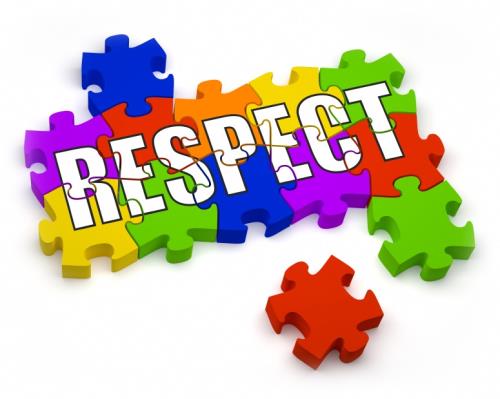 Dignity means worthy of honor and respect, having merit. It stems from the Latin dignitas meaning “equivalent to.” Dignifying others means to confer honor or dignity or to ennoble them. It means showing respect for another’s worth and acknowledging each person as equivalent to every other person.
Dignity means worthy of honor and respect, having merit. It stems from the Latin dignitas meaning “equivalent to.” Dignifying others means to confer honor or dignity or to ennoble them. It means showing respect for another’s worth and acknowledging each person as equivalent to every other person.
As leaders, we’d all agree that it’s important to dignify others.
But what others? And why? In what ways? And just what does it mean to dignify others?
In March, we tackled those questions in the CONNECT2Lead blog with a series of guest posts. The diversity of viewpoints about who, what, where, when, why and how to dignify others offered new insights and plenty of food for thought for leaders.
From the series, one important takeaway was this: No matter how good our intentions, inadvertent indignities occur. We mess up sometimes without realizing how we have missed the opportunity to dignify someone or have made a choice that had the opposite effect.
Laura Brown, a bilingual trainer and government affairs representative for agriculture groups, pointed out how we, as consumers, overlook the dignity of farmers and fieldworkers. Jeff Shore, author and keynote speaker, wrote about the common responses we have to the homeless and offered an alternate response that is far more dignifying. Karen Kaffenberger wrote a mother’s story about the indignities embedded in mental health care.
In all these examples, the guest bloggers pinpointed accidental indignities, the ones we don’t mean to inflict on others. In each of these examples, the usual response is widely accepted and shouldn’t be. As leaders, knowing others model their behavior after ours, these are important reminders. These are opportunities for us to take a stand and lead change in the interest of dignifying others – all others.
Some of the other writers focused on situations where our failure to dignify others compromises our effectiveness as leaders. Ben Nesvig, a marketing strategist, shared the tragic story of Ignaz Semmelweis as an example of a leader who was, technically, correct in his arguments but alienated others because his approach did not offer dignity to them. The results were devastating.
Mazarine Treyz, a workplace empowerment expert, shared her own story about workplace bullying. Her links back to what’s happening in the public school system may shed some light on why we misunderstand how to dignify others and tolerate behaviors that rob people of their dignity. As leaders, recognizing and changing these behaviors can make a significant difference within our work teams.
The series is an important one for leaders who want to understand others’ perspectives to read. Christine Lattimer, international leadership coach and consultant, summed up the most important takeaway of all. She said that dignifying others is not a behavior but a belief, concluding that “To truly dignify others, without conditions, without judgment, requires a change of belief about our separateness. Then leaders at all levels will truly lead with dignity.”
If you’d like to read the complete series with 31 different points of view about the importance of dignifying others as you lead, you can find it here.
Once you’ve read about dignifying others and considered your own opportunities for doing so, try this.
Monitor your interactions with others in the workplace for one week. This is a solo exercise, intended to boost self-awareness, so there is no need to involve others.
Here are some starter questions to consider in your self-assessment:
1. Do I treat others (all others) as equivalent to one another and as equivalent to me?
Be honest with yourself on this one because all others includes those you don’t see eye-to-eye with, those who report to you as well as those you report to, and those who have nothing to offer you. A highly esteemed professional at a director level recently said to me that she was made to feel small by a senior executive who never said “hello” as he passed her in the hallway. Dignifying others means treating them as you would like to be treated.
2. How am I allocating my time so I am able to include gestures and behaviors that dignify others?
If you’re constantly stressed and always behind, chances are that you accidentally fail to dignify others simply because you’re responding to time pressures. It happens when the person who calls gets more attention (and dignity) than the one sitting patiently on the other side of your desk. It happens when you cancel meetings with colleagues because something “more important” comes up.
3. What I have done to show respect to every member of my team today?
Simple appreciation, recognition and acknowledgement of others’ efforts means a great deal to them. Respect for the effort sometimes gets overlooked in the quest for final results. What also gets lost in the long-term view is the short-term opportunity to dignify others.
You’ll see patterns in your own behaviors over the course of a week if you focus on these questions. With those patterns, you now have the information you need to modify your behaviors and to deliberately dignify others more often.
 Written by Deb Calvert, President, People First Productivity Solutions-Author of the DISCOVER Questions book series, Deb has worked as a sales productivity specialist and sales researcher since 2000. She is certified as a Master Sales Coach, Master Trainer, and host of CONNECT! an online radio show for selling professionals where listeners ignite their selling power in just an hour. Deb helps companies to boost productivity through people development. This work includes leadership program design and facilitation, strategic planning with executive teams, team effectiveness work, and performance management program design.
Written by Deb Calvert, President, People First Productivity Solutions-Author of the DISCOVER Questions book series, Deb has worked as a sales productivity specialist and sales researcher since 2000. She is certified as a Master Sales Coach, Master Trainer, and host of CONNECT! an online radio show for selling professionals where listeners ignite their selling power in just an hour. Deb helps companies to boost productivity through people development. This work includes leadership program design and facilitation, strategic planning with executive teams, team effectiveness work, and performance management program design.
About ManagingAmericans.com
We are America’s Management & Leadership Center for Professional Development. Our well-rounded business content is designed for Leaders & Managers to implement change with ease & improve accountability amongst their teams. Here you’ll find Articles from 30+ Expert Consultants, Coaches & Thought Leaders, access practical Business Templates, learn new skills & connect to our Expert Panel to answer your organizational challenges.